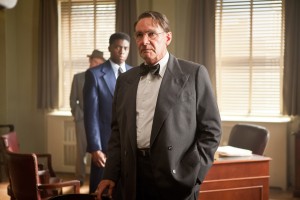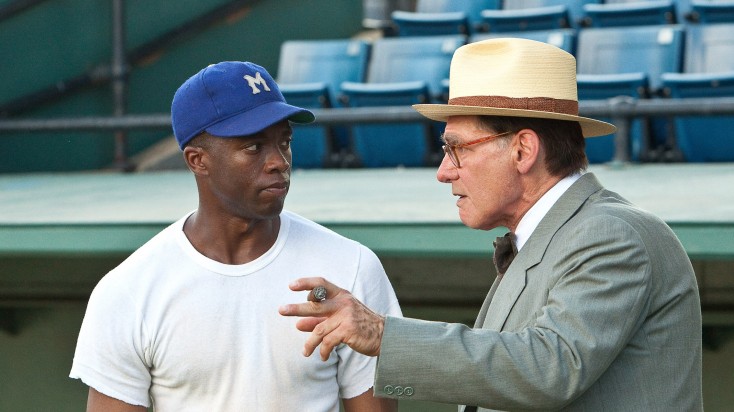
(L-r) CHADWICK BOSEMAN as Jackie Robinson and HARRISON FORD as Branch Rickey in “42.” ©Warner Bros. Entertainment/Legendary Pictures. CR: D. Stevens.
By ANGELA DAWSON
Front Row Features
HOLLYWOOD—In his storied 47-year career in movies, Harrison Ford has never appeared in a sports movie and rarely has depicted a real life person. In “42,” he does both, playing Brooklyn Dodgers owner Wesley “Branch” Rickey, who broke the color barrier in 1945 by signing African-American Jackie Robinson to a minor league contract, and then bringing him up to the majors two years later. Though both team owner and ballplayer received harsh criticism for the bold move, they forever changed Major League Baseball. Robinson (played in “42” by Chadwick Boseman) became a baseball legend, playing six World Series and helping his team win the 1955 World Championship. He also was inducted into the Hall of Fame in 1962.
Written and directed by Brian Helgeland (“Payback,” “A Knight’s Tale”) “42” delves into those groundbreaking early years of integrated major league baseball. The title, of course, is a reference to Robinson’s jersey number. Every April, Jackie Robinson Day is celebrated with players from every team proudly wearing the number 42 (which was retired for all teams in 1997) to honor the man who altered the course of sports history.
Sitting at a table set up at the Sports Museum of Los Angeles surrounded by priceless memorabilia, the 70-year-old Ford, best known for his fictional onscreen roles ranging from Han Solo to Indiana Jones to Jack Ryan reminisced about playing the real life forward-thinking baseball executive.
The normally stoic and very private actor even gets a bit emotional at one point when asked about his early career. It is clear that playing Rickey, who defied the unwritten color line in MLB, is a role that Ford clearly relishes.
Q: Did you play baseball while growing up in Chicago and did your personal experience with the sport help you find this character?
Ford: I didn’t play much ball. I wasn’t much of a ball fan. I went to Wrigley Field with my family, I remember Wrigley Field more than the game or anybody in it. I have such a vivid image still of that square of improbable grass in the middle of the city but I never followed baseball that much as a kid, I never followed sports. I played a little Little League. We moved to the suburbs when I was about 12 years old and I played about one and a half games of Little League. The whole atmosphere of anxious parents and more anxious children was too much for me. We, as a family, never went back so I came to this script with very little knowledge of the history of baseball or current baseball so it was a study for me when I became involved.
Q: Can you tell us about researching Branch Rickey because you’re almost unrecognizable behind the bushy eyebrows in the movie? Also, what resources did you have to capture his gruff voice?
Ford: There was actually more audiotape available of him than there was visual material but there was some. I tried to find as much of it as I could. Brian and his people who worked on the film helped me a lot in that regard. I studied all the photographs and early on I had the idea that the film would be much better served by a Branch Rickey lookalike than a Harrison Ford lookalike and I didn’t want the audience to go into the film thinking that they knew me from some previous experience in a movie. I knew that was Brian’s ambition as well so I invested in the process of what I should do and what I shouldn’t do to achieve the look of the character. What helped more than anything else was the fat suit because it really did give me a sense of what it’s like to maneuver at that size. He was 65 years of age at the time of the telling of this story so I was given the opportunity to play a younger man, which is not going to happen a lot anymore. What was interesting to me is I remember my father during that period of time and other men of that age at that period in time. We’re lucky now. We live better but 65 in those days was an older man so I wanted to acknowledge that part, that he wasn’t healthy and hearty at that point in this life. It really helped me to be specific about behaviors that I observed and bring that into play as utilities to help describe the character and tell the story.
Q: Would there have been a Jackie Robinson without a Branch Rickey?
Ford: Well, there was a Robinson and he was distinguished (in the so-called Negro leagues) before his discovery by Rickey. It would have been another 10 or 20 years before the civil rights movement happened. After what happened in baseball, that’s what shouldn’t be forgotten either.
Q: This movie that portrays blacks in a positive light and not a stereotypical light. Are you pleased about that?
Ford: The best movies are made not from a point of view that depends on your personal history, whether it’s the color of your skin or the politics that you had or the place that you come from. The best movies are made with a point of view of an understanding of human nature, an understanding of history and an understanding of what motivates people. That’s what makes a good movie from an emotional place and I think that this movie serves all those requirements. I think there often are movies that do that and I hope there will be more. This is a movie about the history of racial equality in the United States and it makes it visceral history. There’s a kind of writing, which I call for convenience “talk-story,” where you are talking about the story. But a better form of writing and a better form of filmmaking is to let the audience experience the story and to be emotionally involved or at least seeing, feeling and experiencing the story as it unfolds rather than talking about it. Brian did that in the scenes of the Philly manager (shouting racist comments as Robinson went up to bat.) People that I’ve talked to that have seen the film have taken away from this experience a visceral understanding that is greater than one normally has and those are the people that are going to go forward in their lives and their experience and recognize that this is something that they need to work against. (Racism) is something they don’t want their children exposed to. This is something they don’t want to see in their lives. They recognize the truth of it and the undeniable evil of it.
Q: What was your experience was like when you got your first big starring role?
Ford: I was an overnight success. (He chuckles.) It was just a real long night. The only ambition that I ever had committing to want to be an actor was to live my life. (He gets a little choked up at this point as he reflects but then composes himself to continue.)
Q: What attracted to you doing this film?
Ford: It was the quality of the script that I read and the understanding and the sheer capacity to know where success lives in the business of making movies. I don’t mean box office success, I mean in terms of quality of the writing and ambition of the writing. The thing that attracted me to this is that I never even thought about doing something that I’ve never done before or proving anything to anyone. I just thought that this was such an ambitious and well-qualified recipe, and the opportunity to be part of something great. With all of the actors’ commitment to the ideas that Brian illuminated and in a very discipline and with an incredibly light touch continued to nurture and focus and point and adjust for all of us as well as himself. Without him we wouldn’t have this piece of work.





